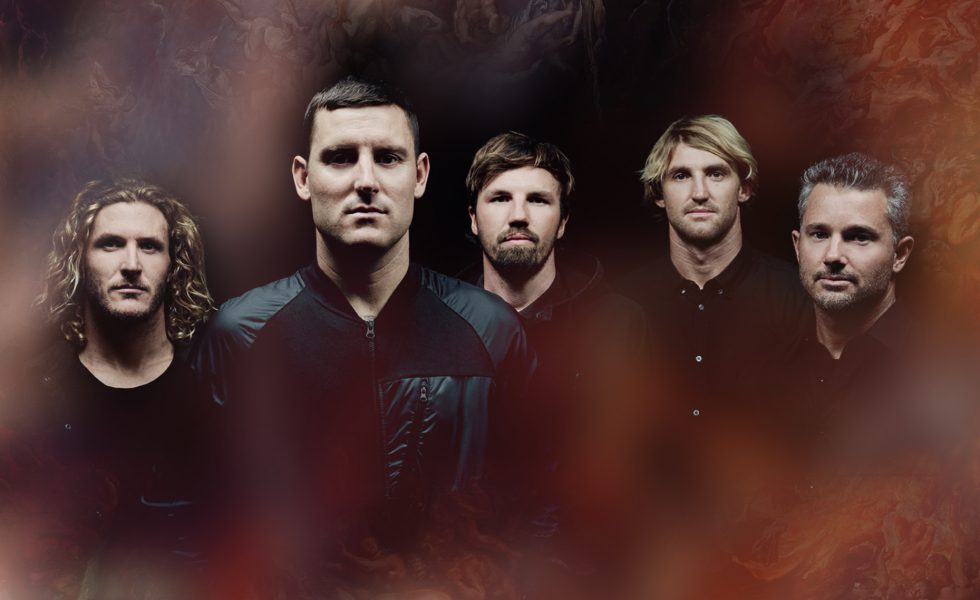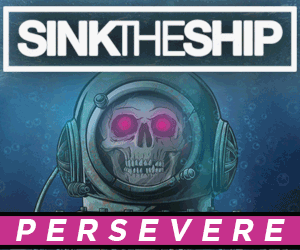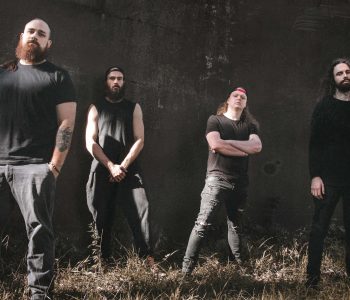As Flaming Wrekage’s brutal fourth album tickles your earholes, you know this is something special. …
This is not a story of triumph. Playing to tens of thousands of people across the world, their most successful album to date and a sold out ten year anniversary tour of a beloved album would suggest that. But for Parkway Drive, the past three years have been a living hell.
MORE: Dead Of Winter Festival: Drop Mammoth Second Line-Up Announcement
Their new record Reverence came with the monstrous first single Wishing Wells complete with the declaration: “Tonight I’m killing gods.” Fans would be forgiven for thinking the record would be about standing tall, about harnessing anger and unleashing it for something good. That’s the narrative we get in the face of adversity. We take the worst and harness it to make our lives better. Reverence is not that record. Sitting in Melbourne with vocalist Winston McCall, it’s very clear there’s something off.
The discussion begins innocently enough. We ask how he managed to build up to actually singing on this record. “At the ten year mark I got my vocal chords checked out to see if everything was all good. They said it was all okay, all great. I hadn’t learnt any singing technique up until that point in time because I’d just assumed that A. there was no technique and B. I couldn’t sing because I would’ve shredded my vocal chords. So I started learning how to sing and learnt everything I could about being a vocalist. I never stretched, I never warmed up I just got on stage and went ‘blah!’”
Continuing on, McCall says that previous record Ire served as the first step towards figuring out a completely different sound for their future. “When it came to the melody we still wrote the guitar melody and put any melody I put into the vocals to the guitar. This time around the nature of the material necessitated a character within the vocals that wasn’t screaming basically. We wanted it to be as clear a representation of who we were as possible which meant that these passages and different techniques and sounds … it simply meant finding what was needed for that area of the song. The vocal melody for Shadow Boxing had been there for a year and I would go through it over and over. So when I went into the studio I just sang it. It wasn’t like we suddenly decided on it and went ‘oh fuck, this is really good’. Simply from a personal standpoint there were things we were doing and sounds that we wanted to approach and use, and we said ‘screaming just ain’t gonna work over this.’ If you want it to hit the mark and be true and honest, you have to go in a different direction to find something that works. That’s where the softer stuff comes in.”
The album’s closer is a haunting spoken word piece that barely features anything else but McCall questioning why death has to take a friend so early. It’s easy to think this is just a pretence of honesty in fiction; a piece cleverly written from the perspective of someone who isn’t in the prime of his career. There haven’t been any signs of anything going wrong from all accounts in the past few years. But the normally happy go lucky smile fades, and suddenly the singer is sobered. “The albums are a snapshot in time,” he says. “Every album we write, we write over a long period of time. It reflects who we are, and where we are mentally and personally. To be able to create the music.”
I wrote half the lyrics after my dog passed away from cancer and literally watching that being leave the body that it was in … Then I had to bury him. The colour of leaving [I reference] is the colour that the sky was at that point in time. The other half of the song was written right after our friend Tom [Searle, Architects guitarist] passed away.
[ Winston McCall ]
His voice goes quiet as he takes a pause. “I wrote half the lyrics after my dog passed away from cancer and literally watching that being leave the body that it was in … Then I had to bury him. The colour of leaving [I reference] is the colour that the sky was at that point in time. The other half of the song was written right after our friend Tom [Searle, Architects guitarist] passed away. It was just two sets of words I wrote because they were there in my head for whatever reason. That’s where my brain went as some sort of coping process. I just put them down and I knew I wanted to use the words because they meant a lot about how defining those times were. It just happened that they came together to make this piece which sat there as words. It didn’t even get pre-produced; we were in the studio and we didn’t know what the music was but we knew that’s how the album ended. It ended up that we wanted it to carry the weight and the emotion of the time. Heavy and punchy didn’t do it. So it was one scratchy demo guitar; the strings that we put down and that vocal take. It was the one of four, which didn’t end up with me completely breaking down.”
Fans would be forgiven for being shocked by the turn. But signs have popped up here and there. Footage of McCall breaking down shortly after Searle’s passing is one of the most prominent. It seems like the Architects guitarist’s legacy has created a seismic shift in how the metal(core if we must label) world has progressed. Similarly to how devastating the story behind this record is, almost no one outside of close friends and family knew that Searle was as affected as he was. When asked if McCall believes that fans and the industry alike are more open to discussing the shattering grief many suddenly found themselves in, the singer says, “I hope they would be.” He follows up by saying the all-consuming nature of grief he’s found himself in has manifested in “Survivor’s guilt. I wrote the words on this album simply because it was consuming. The grief has been a constant force over the past three years for me. It’s been really intense and confronting. Right when I think it’s done, something else happens. I lose someone else and it’s pretty shitty. It’s pretty fucked when you start having a catalogue of different kinds of treatments for cancer because your friends have gone through all these different things.” He pauses again, shuddering slightly. “That’s a fucking psycho thing. And that’s just me. I’m not even personally going through it. These are people I’m connected to.”
Blaming God and the Devil for things that have gone wrong is simply me trying to blame something when there’s no blame.
[ Winston McCall ]
The band’s previous records have lashed out at rats, pigs, bottom feeders. All outward rage, swinging at anything that they deemed worthy. But Reverence is so deeply personal, it sounds like McCall has turned inward. The vitriol he spits is amplified tenfold when we realise he’s only screaming out because there’s no one to actually blame. What better person than himself to lash 50 times in penance? “When it comes to writing words that’s just what came out,” he says about the lack of direct anger, particularly in Wishing Wells. “There’s not going to be a metaphor, there’s not going to be a target. It’s just me documenting the stages of grief and what they are, and what they’re doing to me. That’s all it is. If I’ve raged outwards in the past it’s because I’ve had the luxury of being able to find the focus to rage out. That’s it. There is raging out on this record, it’s just been written in a different time so it’s come off in a different way. There’s just plenty of times where the rage has been where I can’t find something to direct it at. Blaming God and the Devil for things that have gone wrong is simply me trying to blame something when there’s no blame. When I say I’m ‘trying to find a place, a place to place the blame’ that’s a fucking way to try and cope.”
The record’s cover is the first place to start when realising this isn’t just a small step forward for the band. You’d be forgiven for initially thinking it’s made up of an oil slick. But look closer and the biblical imagery becomes impossible to miss. “It’s a piece called Fall of the Damned. It shows the damned being thrown out of heaven by the archangel Michael,” says the vocalist. “The idea for the artwork was that I wanted it to be dark. The record is dark and it felt like the fall for us; the fall for me personally.”
I wanted it to be something people didn’t expect; I wanted everything on this album to be what people wouldn’t expect. To be Parkway, but to be everything you thought we couldn’t do.
[ Winston McCall ]
We’re halfway through our interview and there’s still a vulnerability that lingers when McCall talks. PR spin is out the window here, as he continues trying to put across just how hard this whole process has been. A man that seems to have stood so strong throughout their career as a band, but right now he’s just a man who’s had to watch multiple close friends and a beloved pet disappear from his life in quick succession. Hell, he’s close to tears and it’s hard not to well up as he describes going from the band’s peak to a personal rock bottom all in a moment. “When everything went down it was during the process of playing European festivals right after Ire launched. We were headlining to tens of thousands of humans, which is the biggest shit we’ve ever done. Then being smashed down by the worst news you can get … it literally felt like being thrown from this high down to hell. I wanted it to be something people didn’t expect; I wanted everything on this album to be what people wouldn’t expect. To be Parkway, but to be everything you thought we couldn’t do.
So that’s where the artwork came from and I sent a brief to our art guy saying that, and he knew exactly what I meant. He sent through Caravaggio and all these artists, and eventually he sent the final piece through and I said ‘that’s the one, please tell me we can get that one.’ Thankfully it was in the public domain. But it’s like everything: you can try and force concepts but as soon as you see the thing that’s right, you literally can’t unsee it. When you hear the right riff, you can’t unhear it. You’ve gotta roll with that and that’s what we did with the record. It doesn’t matter how out there it is. If it’s right, it’s right and you work with it.”
That’s what the last line on the record is. When you lose certainty and you have these gigantic holes ripped out of your life, you have faces that you remember. You remember interacting with them and the sound of their voice and now they don’t exist. You realise how quickly it can all go. You realise to take note how much even the smallest things mean.
[ Winston McCall ]
That’s always been the Parkway spirit. Get on board, or get the fuck out of the way. But rather than using Reverence as a wrecking ball to dismantle people’s perceptions (Vice Grip anyone?), the band are simply showing how they’ve lived the past few years. Coped might be a better word to describe it. Broken, scarred and willing to put anything on record that will help listeners understand. “After all of this; after everything we’ve been through … as a human at the end of it standing as a person, I realise how frail everything we have is,” chokes McCall. “That’s what the last line on the record is. When you lose certainty and you have these gigantic holes ripped out of your life, you have faces that you remember. You remember interacting with them and the sound of their voice and now they don’t exist. You realise how quickly it can all go. You realise to take note how much even the smallest things mean.
That’s why the record was created. It’s what we enjoyed writing as musicians and that’s what we had to deal with. At no point am I going to make an excuse or pander to anyone else because no one else has my time. If you’re aware of it, life’s fucking amazing and you’re lucky to have it. That’s the thing. It doesn’t have to be big, and it can be very very tiny. That’s what it came down to. Reverence is a reference to the perspective in the aftermath.”
With such an intensely lyrical record, there must be a wealth of references the vocalist pulls from. Hell, this is the band that wrote “my convictions lay bare before the tempest” in one of their most vicious pit songs. But McCall says the opposite—“I’m not holding any degrees, I failed English.”–and describes it’s a love of language that he taps into. “I like words. I like the way they sound, I like the way they look. When I listen to music, it’s the lyrics that get me. I can listen to the slickest catchiest chorus in the world, but if it doesn’t get me with the words? Then it doesn’t get me. It will fly past. Sometimes I just want to go: ‘I’m pissed, fuck you: this song’s called Bottom Feeder.’ There’s no real reading around and it’s not super metaphorical.
Catharsis seemed to be the thing you say when these things happen. But there’s been no sense of closure. There’s just simply been more time passed since it all happened.
[ Winston McCall ]
But at some points in time … I wanted Cemetery Bloom to reflect something different. It’s very dark but I love those set of words. I found that the darkness has a beauty in the words and the actual words used, as well as the construction of the sentences and the images they convey. If I had used any others, it wouldn’t have done justice for what I wanted to create when I created that song. It’s not so much about reading anything in particular, it just comes down to imagination of some kind. I’m not a massive student of anything. I know what moves me and when words are the things that move you, words are the things that gravitate towards you. You find yourself making the effort to use the right words.”
As we near the end of the half hour that feels like it could extend forever, Hysteria ask finally whether writing is what helps the most when faced with the pit of despair. “To be honest it’s not that it just helps, it’s just there,” McCall offers as explanation. “It’s simply me doing what I do when [the grief] is there. I put these things down without a second thought originally. I had to create the sounds and it was … torment. The Colour of Leaving was fucking torture trying to do that song. Dealing with that is very raw and doing press … now I have to actually explain it to people. We never told anyone about this stuff. So now explaining is still hard. I do interview after interview and when I get to the point of explaining what’s going on, there’s no auto pilot.
I still have no idea what the fuck to do. I just explained it five minutes before this and how can I word it again … I can hardly get the words out. The first interview I did I said the writing was cathartic because I had no idea what to say. Catharsis seemed to be the thing you say when these things happen. But there’s been no sense of closure. There’s just simply been more time passed since it all happened. So the fact it’s continued and these things keep happening, it all builds up and time just passes. That’s it. Luckily I’m here and I’ve learnt to take note of what we do and just be happy with the life that I have.”
McCall smiles sadly, “If I can provide a bit of something beautiful sonically that makes me feel a certain way to go along with the complete tragedy of it, that’s at least a marker. At the end of the day I’m not looking for closure, because nothing’s going to provide it.”





